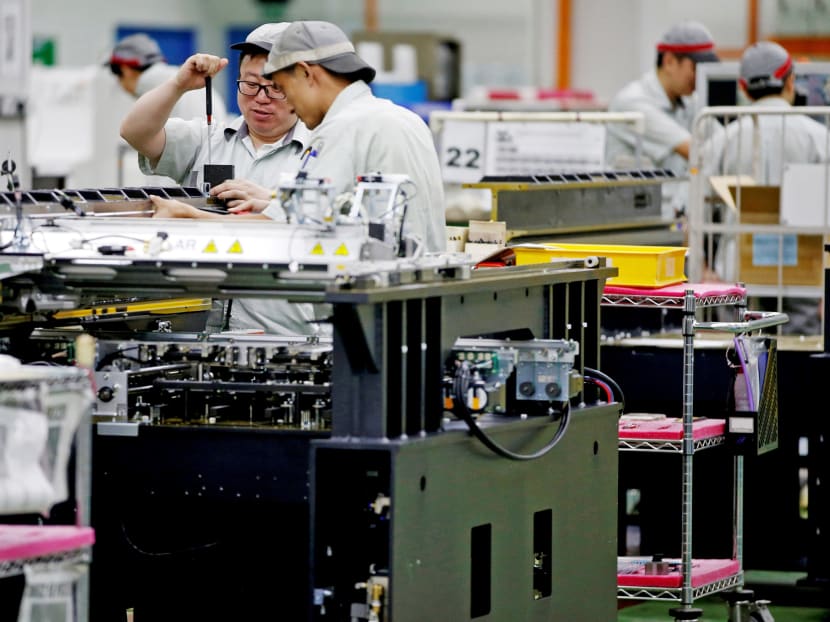How technology can boost productivity in manufacturing
The manufacturing sector is a key driver of Singapore’s economic growth, accounting for 20 per cent of GDP and half a million jobs. The sector is also setting a good pace for economic growth—in the last three quarters, growth averaged more than 10 per cent.
The manufacturing sector is a key driver of Singapore’s economic growth, accounting for 20 per cent of GDP and half a million jobs. The sector is also setting a good pace for economic growth—in the last three quarters, growth averaged more than 10 per cent.
One way the industry can sustain this growth momentum is to reconsider how businesses approach their technological processes. How can manufacturers sustain this surge in productivity and keep increasing their levels of output?
The Government has announced significant investment in Industry Transformation Maps (ITMs) for the manufacturing sector, making the next 12 months an exciting, and potentially transformative, time.
The ITM, as an integrated approach to develop skills, innovation and productivity, consists of a growth and competitiveness plan to promote technology adoption and innovative business models.
This includes strengthening of human capital, boosting innovation and building state-of-the-art digital infrastructure. This has underscored the importance of technological investment to address productivity issues in manufacturing.
With investments of S$19 billion over five years dedicated towards robotics, artificial intelligence and boosting digital skills , the necessary pieces are being put into place to address Singapore’s productivity puzzle.
This new approach to facilitating the adoption of transformative technology will enable those who are bullish in embracing innovation to reap its rewards.
In fact, a recent study from Epicor Software found that 28 per cent of Singaporean companies that experienced very high growth in the last 12 months believe technology has had a positive impact on their business.
Firms who refuse to update their production systems with better technology will only stand to lose.
Investment in digital transformation among manufacturers will be key to boosting productivity, allowing workers to adopt new processes and become more efficient.
Embracing the Internet of Things (IoT) is one such example that manufacturers should explore.
Increasing connectivity between machines, computers and humans can enhance efficiency levels. The potential for digital systems to improve productivity is vast.
Having such systems in place enables internal teams to identify where operational inefficiencies originate and allows senior management to develop strategies to meet their Overall Equipment Effectiveness (OEE) standard – a metric that measures the percentage of production time that is truly productive.
For instance, Southco, a manufacturer of fasteners and latches for access, were surprised to discover their OEE levels were running at 52 per cent, a far cry from its target rate and significantly short of the world-class standard of 85 per cent.
Since implementing the Mattec Manufacturing Execution System, Southco is able to monitor its production and process manufacturing operations in real-time, allowing it to reduce scrap, waste and machine downtime. Overall, this has helped to improve productivity at Southco, which now operates at 75 per cent OEE.
The concept of digital twinning has also gained momentum in recent years as more manufacturers invest in smart machines that are transforming the industrial landscape.
Defined as the mapping of a physical asset to a digital platform, digital twinning helps manufacturers to gather data from sensors on their machines to find out how they are performing in real-time.
This gives the manufacturer valuable insights that can help improve production processes and the final product.
The use of robotics is already a priority for many manufacturers. From welding to assembly machines, factory floors are beginning to see effective and thorough applications of robotics in the production process.
This frees up employees to focus on more difficult tasks, providing them with the opportunity to upskill.
Augmented reality is another technological development that many manufacturers are implementing and reaping rewards from. More than just creating illuminating experiences for employees to engage with their workloads, this technology allows for far greater accuracy when conducting complex tasks.
Not only will it optimise production levels, but it also offers a level of precision that can be very effective in manufacturing.
Manufacturers may also be looking to blockchain in the near future to further enhance productivity. Whilst this technology is currently most commonly associated with cryptocurrencies, blockchain could be hugely beneficial in enabling manufacturers to oversee their entire supply chains in the future, as these online ledgers provide the opportunity for those at all levels of production to input data where problems may have occurred.
In doing so, employees at all levels can access data to trace where an incident originated from. This can greatly enhance efficiency, as employees need not comb through paperwork trails, but will instead have instant access to information.
Whilst some of these technologies may not be relevant to all manufacturers right now, having sophisticated enterprise resource planning and manufacturing execution software technology to assist production, automate processes, assist with resourcing and provide one source of data for all users, will provide great dividends to manufacturers across the board.
Fundamentally, the manufacturing sector has every reason to be optimistic in 2018. However, to continue to enjoy a period of growth, investment in technology will be essential.
ABOUT THE AUTHOR:
Vincent Tang is regional vice president for Asia, Epicor Software.







